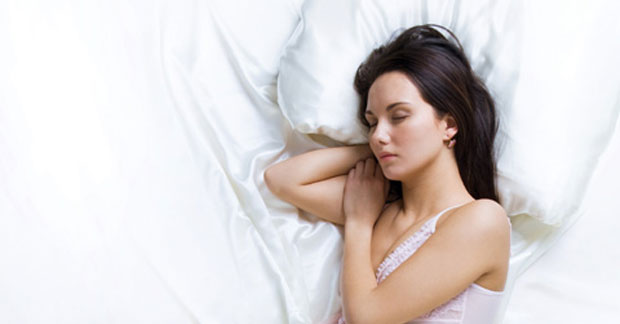Advertisement
Snooze or Lose
Test your sleep knowledge

Rest assured, researchers are constantly dreaming up new studies that demonstrate the importance of sleep for our health—physical and psychological. Take our quiz to test your knowledge of the latest findings in the field of sleep research.
Q: Sleep deprivation contributes to higher levels of inflammation, which increases the risk of heart attack and stroke. True or false?
TRUE: Researchers have found that people who got six or fewer hours of sleep tested 25 percent higher for C-reactive protein, a marker of inflammation and heart disease, compared to people who got six to nine hours of sleep.
The result was significant even when risk factors such as smoking, diabetes, obesity, and blood pressure were taken into account.
Inflammation caused by less or poor-quality sleep may increase the risk for heart disease and stroke. More research is needed to determine whether less sleep contributes directly to cardiovascular death or whether it’s a moderating factor.
Q: A good night’s sleep can improve memory and boost creativity. True or false?
TRUE: Recent research shows that sleep actually strengthens, reorganizes, and restructures our memories. While we sleep we hold on to the most emotional parts of our memories.
Subjects were shown a scene with an emotional object such as a car wreck. After a full night’s sleep, subjects were more likely to recall the car wreck (the emotional object) rather than a palm tree in the background.
During sleep the areas of our brain that govern emotion and memory consolidation are at work. Researchers hypothesize that this nighttime brain activity may be what helps us to develop creative new ideas.
Q: Everyone suffers from insomnia at some point; it’s nothing to worry about. True or false?
FALSE: Especially for men. A study of 1,000 middle-aged women and 741 men found that men with chronic insomnia were four times more likely to die during the 14-year follow-up period than men without insomnia who slept for six hours or more a night.
Chronic insomnia was defined, for the purposes of the study, as sleeping less than six hours a night. Risk of death was also higher for males who suffered from diabetes or hypertension.
Researchers were unclear as to why the mortality risk was greater for men than women, but cautioned people with health problems and insomnia to seek medical advice.
Q: We can successfully block out traffic noise while sleeping. True or false?
FALSE: While some of us may be more adept at blocking out nighttime noise than others, researchers have found that exposure to nighttime traffic noise not only disturbs sleep, but also may result in impaired neurobehavioural performance the next morning.
Train noise was ranked number one for waking and disturbing sleepers, followed by automobile traffic and airplane noise. However, when tested the next morning, sleepers’ neurobehavioural performance was equally impaired by all three types of noise. Being exposed to more than one type of these noises did not increase their negative impact.
Researchers caution that children, the elderly, shift workers, and people who suffer from chronic medical conditions are most impacted by sleep disturbances. One solution may be to use white noise generated by fans or special machines to mask traffic noise.
Q: The number of hours we sleep has no effect on our weight. True or false?
TRUE and FALSE: If we want to lose body fat, researchers tell us we need to get a good night’s sleep. In a small study, 10 women were put on a 1,450-calorie-a-day diet for 14 days and slept 8.5 hours a night. During this period, they lost 6.6 pounds of weight, made up of 3.1 pounds of fat and 3.3 pounds of fat-free body mass.
For another 14 days, caloric restriction was the same, but subjects slept for 5.5 hours a night. Weight loss was identical in both periods. However, during the period of restricted sleep, the women lost 1.3 pounds of fat and 5.3 pounds of fat-free body mass.
Adequate sleep also helped control the dieters’ hunger by maintaining low levels of the hormone ghrelin that triggers feelings of hunger.
Q: Staying up late doesn’t harm our health as much as pulling an all-nighter. True or false?
FALSE: In a recent study on rats, researchers restricted the animals’ sleep to four hours a night for five nights. The effect on the rats’ brains was similar to the effect of acute total sleep deprivation, what we experience when we pull an all-nighter.
We assume that we can always catch up on sleep, but researchers caution that a lack of sleep can be harmful. Even mild sleep restriction for a couple of nights can detrimentally affect a person’s ability to perform cognitive tasks, such as work-related tasks or driving.
When researchers measured the rats’ brain waves, they discovered that slow wave activity increased even while the rats were awake, indicating a need for sleep.
Research has also shown that restricted sleep can increase our resistance to insulin, which can increase our risk of developing diabetes.
Natural sleep aids
Melatonin
Used to decrease the time it takes to fall asleep, melatonin increases feelings of sleepiness and may increase the length of time slept. Studies show that melatonin is safe to take for periods of up to three months. Fast-release melatonin may be more effective than the slow-release type.
5-hydroxytryptophan (5-HTP)
This amino acid may reduce insomnia; it plays a role in the biosynthesis of serotonin and melatonin from tryptophan.
Camomile
Taken as a tincture or a tea, camomile has been used for centuries as a soothing sleep aid. It is also noted for its anti-inflammatory and antibacterial properties.
Caution: before taking any sleep aid, consult your health care practitioner, especially if you are pregnant or breastfeeding, drink alcohol, or take medication.




